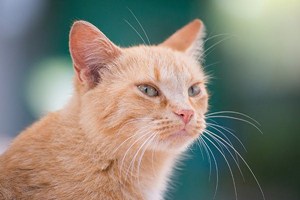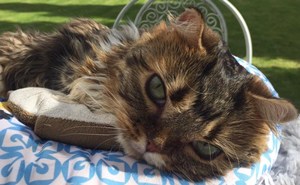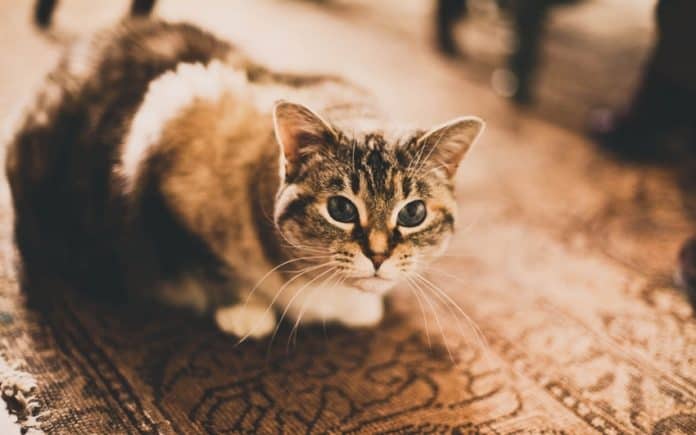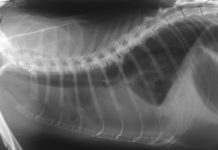Mucopolysaccharidoses in cats –a group of metabolic conditions, which is characterized by the accretion of mucpolysaccharides or glycosaminoglycans –of GAGs, because of the weakened lysosomal enzymes functions. It’s the mucopolysaccharides that assist in building cartilage, bones, corneas, tendons, as well as the fluid that’s responsible for lubricating the joints. The more susceptible cat breeds to this condition are the Siamese and Domestic shorthair cats. In this article, we will discuss some more interesting facts about mucopolysaccharidoses in cats including its causes, symptoms, prognosis, as well as treatments. Read on to learn about these and many more!
What is Mucopolysaccharidoses in Cats?

The mucopolysaccharidoses is a group of 5 different lysosomal conditions. The lysosomes, as we know, are the storage sacs in the cells, which hold the enzymes necessary in digesting large molecules like the lipids, glycoproteins, etc. –to be recycled later. In the event that the storage function is properly carried out, the enzymes aren’t present in digesting large molecules and the animal cell is left with the glycosaminoglycan accumulation. These glycosaminoglycans are essential in promoting the cell growth, playing a vital role in the cat’s physiological functions and vertebral structure.
In addition, the mucopolysaccharidoses is a condition, which is being inherited from the mother or the father of a cat. The condition may affect how the cat grows, obvious through deformities and dwarfism of the facial structures of the cat. When both parents carry the MPS or mucopolysaccharidoses gene mutation, the kitten may develop the symptoms in as early 6 to 8 weeks of age and the hind limb paralysis might happen at only eight months. Nonetheless, if only one of the parents carry the mutated gene, the kitten may appear fairly healthy and might just have minimal skeletal deformities. The mucopolysaccharidoses in cats is irrepressible and typically affects the cat breeds like domestic shorthair cats, Siamese, Birmans, as well as Ragdolls.
Causes
The mucopolysaccharidoseus a hereditary condition, which is passed into the genetic makeup of the parent to the offspring from a generation to another. The precise cause on why the mutation is present is actually not known, but inbreeding may seem to be a common link. The mucopolysaccharidoses in cats is not curable.
Symptoms
The mucopolysaccharidoses may cause a cat to accrue huge amount of glycosaminoglycans and polysaccharide. The glycosaminoglycans invade the skin cells, as well as the cells of the bone marrow and white blood cells, th8us causing a feline to develop the following:
- Reduced flexibility
- Thickening of the heart valves
- Enlarged liver
- Corneal clouding
- Mental disorders
- Dwarfism
- Stunted growth
- Paralysis
- Bone degeneration
- Skeletal abnormalities
- Facial deformities, which is characterized by a wide space in between eyes, flattened face, and small ears
Prognosis

The prognosis of mucopolysaccharidoses in cats may start with the evaluation of the medical history of the cat, as well as its breeding background. This condition is hereditary and starts with the parents of the cat. Therefore, if you have an information on the family tree of the cat, it might be beneficial to bring them with you in your appointment to the vet. The vet might take some time to discuss the recent symptoms and behavior of the cat, while they physically assess the cat via a physical examination.
Moreover, mucopolysaccharidoses is a mutation in the cells of the cat, including its blood cells, hence the vet may likely to examine the urine of the cat, and even its blood. A blood smear test may allow the veterinarian to have a closer look at the cat’s white blood cells, which might have granules and vacuoles existent. An enzyme test may eventually pinpoint the prognosis, since the lysosomal enzyme that acts topsy-turvy in the mucopolysaccharidoses, may be measured in the blood or in the liver. Bone radiographs might also be done in evaluating the type or stage of mucopolysaccharidoses the cat has.
Treatment for Mucopolysaccharidoses in Cats
At this point in time, there is actually no effective way in treating the condition, other than those that are used in catering the symptoms of the cat. Nonetheless, cats diagnosed with mucopolysaccharidoses are great candidates for the enzyme replacement therapy and gene replacement therapy. These therapies are executed via a bone marrow transplant and might be somewhat expensive. The vet might also recommend surgery rather, in order to give the cat a much better life quality.
Cats with mucopolysaccharidoses may have a positive recovery after a replacement therapy, yet results might vary. Managing the mucopolysaccharidoses may prove to be so hard over time, since bone disease is rare in cats as they age. A feline with this malady might not most probably stay inside the cat in order to prevent any injuries and a soft diet may be recommended.
A cat with mucopolysaccharidoses must not also be used as a breeding stock, in order to prevent dispersing the mutation. DNA testing for mucopolysaccharidoses is available at the local lab provider, so talk to your vet to test other cats!









